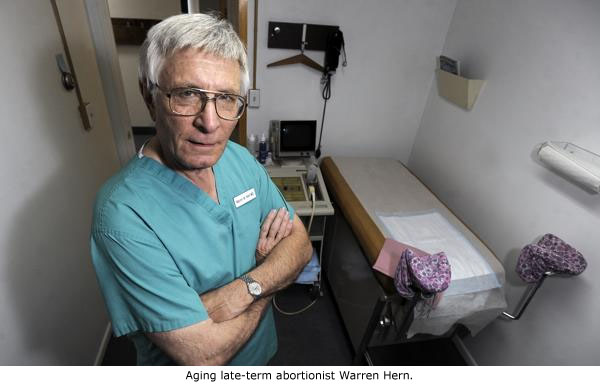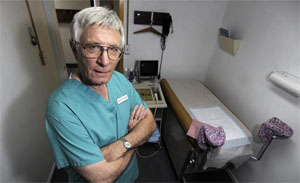
By Cheryl Sullenger
Boulder, Colorado — Jennifer and Jason found out sometime in early 2013 that they were having a baby.
The expectancy of a new son or daughter can be a joyous time for couples, but for them, that joy was cut short after their baby boy was prenatally diagnosed with “severe cerebral abnormalities” near the end of Jennifer’s second trimester of pregnancy. She was told that her son would have a life expectancy of less than one year, if he survived delivery.
After consulting with a number of physicians, Jennifer and Jason made the “difficult” and fateful decision to abort their baby in “the best interest of Jennifer’s health.” They scheduled an appointment at Warren Hern’s Boulder Abortion Clinic, in Boulder, Colorado, the nearest facility where very late-term abortions were available.
They probably wish they could take back that decision.
According to a Federal Court lawsuit filed by them in Colorado, Jennifer suffered a horrific late-term abortion complication that she says has caused her physical pain, mental suffering, and the loss of her ability to bear children. The couple is seeking upwards of $75,000 in medical costs, in addition to attorney fees and any punitive damages that might be awarded by the Court.
The lawsuit alleges four causes of action:
1. Medical malpractice.
2. Failure to warn.
3. Negligent misrepresentation.
4. Loss of consortium.
Warren Hern is a well-known late-term abortionist who founded the Boulder Abortion Clinic in 1973. He was featured in the independent film “After Tiller,” which profiled Hern and three others who openly conduct abortions throughout all nine months of pregnancy.

Hern literally wrote the book on abortion. His Abortion Practice was published in 1984, but by 1989, the original publisher had withdrawn the book from the market and destroyed the remaining copies. He invented a number of surgical abortion tools, including the Hern forceps, scissor-like grasping instruments now commonly used in dismemberment abortions. In all, Hern is considered a leading authority on abortion, especially in the later terms of pregnancy.
In fact, in 1985 and again 1994, when medical experts published the authoritative manual on Fertility Control, they had Warren Hern pen the chapter about “Pregnancy Termination.” There Hern warned,”Abortion complication rates are sometimes higher than they should be.”
He talked about inadequate training, poor technique, and the “commonly held view that some complications are inevitable.” To which he retorts, “Maybe they are, but the best attitude is ALL COMPLICATIONS ARE POTENTIALLY PREVENTABLE.” (emphasis added)
But now, at 77-years old, he appears to becoming sloppy at it.
Jennifer was scheduled for a four-day abortion procedure that was set to begin on December 3, 2013. As instructed by Hern’s staff, she checked into a hotel the evening before her appointment and expected to stay until December 7. She was accompanied by Jason and her mother for support during the late-term abortion process. However, once at the clinic, she was told for the first time that she could only have one support person, so her mother was sent away.
Before Jennifer could been seen, she was required to wire $7,500 in advance to the Boulder Abortion Clinic.
Once the money was received, Jennifer was given an ultrasound and blood work. The clinic staff gave Jennifer and Jason “reading material” and required that they watch an instructional video “produced by Dr. Hern’s office” that described the abortion procedure.
But the printed material and video neglected to mention known risks. In fact, according to the lawsuit, she was never informed or warned of any risks to the planned Dilation and Evacuation dismemberment abortion procedure by Hern or his staff.
After the video concluded, the first step of the abortion procedure began. Hern used ultrasound to locate her baby’s heart then inserted a needle through Jennifer’s abdomen and into her baby’s heart. The drug Hern injected was meant to stop the baby’s heart in advance of the actual abortion procedure that was expected to occur three days later. Once the injection was completed, Jennifer was released and told to return the next day.
On Day Two of the abortion process, a member of Hern’s “staff” inserted 1-3 laminaria sticks and packing through the vagina. Laminaria are thin sticks of seaweed about the width of a pencil lead that expand, gently forcing open the cervix or neck of the womb.
She returned on Day Three, when “clinic staff” removed the laminara and inserted six new sticks. She was told to return to her hotel room and come back the next day for completion of her abortion.
Jennifer woke up early on Day Four suffering from “stomach cramps and discomfort.” Then she began to vomit. She felt the laminaria and packing begin to fall out of place.
Jennifer called the Boulder Abortion Clinic and was told to report to the clinic ahead of schedule. There, she was given an IV and suppository that was supposed to halt the vomiting, but it took “several hours” before the vomiting finally stopped.
Nurses prepared Jennifer for the final step of her late-term abortion, but found that they were unable to get her dilated beyond 1-2 centimeters, which is too small of an opening for a dismemberment abortion at her late stage of pregnancy.
Nevertheless, Hern proceeded with the “evacuation,” in which he would remove her son piece by piece until her womb was completely empty.
At least, that was the plan.
A “numbing cream” was applied to Jennifer’s cervix and Hern began to remove the dismembered parts of her baby. During the process, Jennifer felt “a lot of pulling from the lower half of her body all the way up to her chest,” according to the legal complaint.
The pain was intense – so much so that at some point in the process, she passed out.
“It seems completely barbaric to conduct such an abortion process on a woman without providing adequate pain relief, but this is a complaint we hear all too often from women who have experienced abortions,” said Operation Rescue President Troy Newman. “Denying pain relief during surgical abortions really illustrates how little concern Hern and other abortionists really have for their patients. It is tantamount to torture.”
Hern finally finished the procedure, and Jennifer was sent to a recovery area for a couple of hours. After a visual examination only, Hern announced that her abortion was a success. She was released to go back home to Nebraska.
Jennifer likely thought the worst was over and probably tried to put the unpleasant experience behind her.
But soon, Jennifer began to experience break-through bleeding. She sought help from her hometown doctor, who changed her birth control prescription twice in an attempt to resolve the bleeding issue. Still, Jennifer continued to experience the unexplained bleeding.
Finally, she was referred to a gynecologist who ordered an ultrasound. What he discovered caused him to schedule Jennifer for surgery.
Once in surgery, the doctor tried but failed to remove a mysterious four-centimeter-long object that was cutting into Jennifer’s uterus. He determined that this object was the cause of Jennifer’s months of bleeding. He had no choice but to perform a hysterectomy, permanently ending Jennifer’s ability to bear children.
When the object was finally analyzed, it was determined to be a four-centimeter slightly curved section of bone from her aborted baby’s skull.
“I can’t imagine what if felt like to hear that news. It must have been horrendous,” said Newman. “How ironic that her decision to abortion was ‘in the best interest of her health.’ Would she really have been physically and mentally worse off if she had delivered her baby? Probably not.”
Jennifer insists in her suit against Hern and the Boulder Abortion Clinic that she never was told that there was a possibility that parts of her baby could be left inside. Because Hern had wrongly declared the abortion a “success,” her doctors spent months trying to find other reasons to explain Jennifer’s complication.
Jennifer and Jason’s lawsuit claims that Hern was negligent in seven ways:
1. Hern conducted a Dilation and Evacuation abortion procedure on her nearly third-trimester baby through an inadequately dilated cervix.
2. Hern failed to remove all of the baby’s remains from the uterus.
3. Hern failed to inspect the remains to ensure everything had been removed and accounted for.
4. Hern failed to detect the chunk of bone that he had missed during the dismemberment process.
5. Hern failed to order appropriate postoperative care and tests, which would have discovered the skull fragment.
6. Hern failed to exercise supervision and control over his staff to ensure they provided adequate medical care.
7. Hern failed to provide diagnostic, operative, and postoperative care and treatment “consistent with the applicable standard of care for a physician practicing in Dr. Hern’s specialized area of medicine.”
“From the legal complaint, it looks like there was more effort put into making sure the couple’s money was received by Hern’s bank account than there was in determining whether the abortion was complete,” said Newman. “These were careless, sloppy practices that led to months of suffering and could have cost this lady her life.”
Incomplete abortions are potentially serious complications to abortions and can lead to hemorrhaging, infection, and death, if left untreated.
This case raises an important issue that deserves attention. It is true that many physicians who see patients with complicated pregnancies find it easier to refer the women for an abortion than take the extra time and effort to help her work through her health issues. Sidewalk counselors who have spent anytime offering help to abortion-bound women understand this problem in the medical profession.
“Often, women just need a good doctor who will support them with sound medical treatment and encouragement through their complicated pregnancies,” said Newman. “That can be hard to find in a world where ‘getting rid of the problem’ through abortion is easier than dealing with complicated health concerns. Aborting the baby didn’t work to avoid physical and mental health issues in this case and it probably doesn’t work in the majority of cases.”
If Jennifer and Jason’s suit against Hern and his Boulder abortion clinic is successful, it could serve as the basis for disciplinary action against his medical license.
“If it can be proved that Hern acted negligently, this is a case that should be taken to the Colorado medical board,” said Newman. “Hern’s insurance will probably cover any monetary judgement, but the medical board has the authority to make sure he can never practice medicine again. One can hope and pray to that end.”
Read the Complaint in USDC Colorado Case Number 15-cv-02613.
















